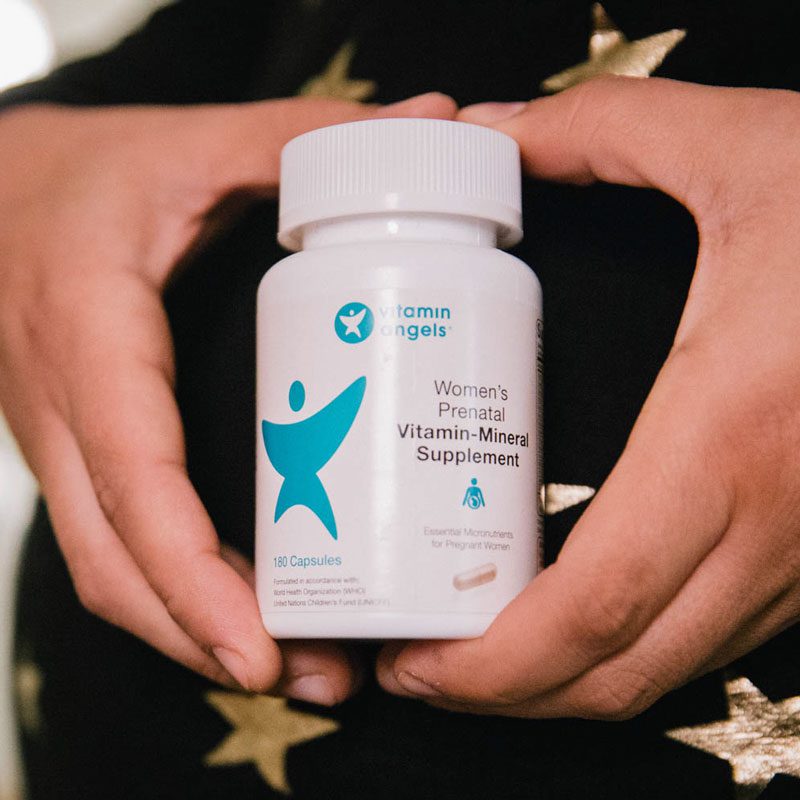Case Study
Vitamin Angels Aims to Improve Maternal & Child Health Outcomes in the United States
Vitamin Angels is working collaboratively to deliver proven nutrition solutions to women and children across the US.
Published: April 2024


Our Annual Reach in the US*
Pregnant Women & Babies
576,888 with MMS
Supplementary Feeding
4,500 households in 4 states with food assistance
National Coverage
Working with 350 partners in all 50 states + Puerto Rico
*Reach is based on Vitamin Angels’ shipments that were largely distributed in 2023.
Our Team
- Colleen Delaney, PhD, RDN, Technical Director for US Programs
- Bridget Quanstrom, MPH, Senior Program Officer, US & Canada
- Alicia Mendoza, MPH, CPH, Program Officer, US & Canada
Maternal Health Crisis
The maternal mortality rate in the US surged by 40% in 2021 – making it nearly ten times higher than other high-income countries.[1][2] The maternal death rate for black women is 2.6 times higher than that of white women.[3]
Public Health Challenges
CHILD HEALTH
In the US, 9 million children are food insecure, and obesity affects one in five children and adolescents.[4][5]
MATERNAL HEALTH
~12% of pregnant women are anemic, increasing their risk of complications like preterm birth and postpartum hemorrhage, one of the leading causes of maternal death in the US.[6]
In the US, Vitamin Angels offers evidence-based nutrition interventions for women and children, including MMS for women of reproductive age, and uses a rigorous scientific approach to identify strategies to provide breastfeeding and nutritional support.
Vitamin Angels Collaborates with Partners to Improve the Health of US Communities
Vitamin Angels began working with partners in the US to distribute multiple micronutrient supplements (MMS)—commonly known as prenatal vitamins and minerals—to pregnant women in underserved communities in 2013. Today, Vitamin Angels partners with over 350 organizations, including WIC clinics, Federally Qualified Health Centers (FQHCs), and Health Departments throughout the US and Puerto Rico. We provide technical support to these partners, who then distribute our MMS to women of reproductive age. Additionally, we are working to expand the breadth of our work by piloting materials to support MMS counseling, and collaborating with key partners to conduct formative research on breastfeeding and to support the development of supplemental feeding programs for pregnant women and young children.
Program Context
While the United States has made progress toward global health and nutrition targets, some trends, including maternal mortality and anemia rates, are moving in the wrong direction, and millions still face hunger and malnutrition.

Our Approach
Vitamin Angels is Working to Advance Access to MMS for Women in the US
Nutritional Needs Increase During Pregnancy
Undernourished women are more likely to develop serious complications during pregnancy and birth. Iron deficiency, for example, is the most common cause of anemia, which increases the risk of poor pregnancy outcomes—including babies being born too soon or too small, and maternal and newborn mortality.[7] MMS can safely and effectively improve maternal health and pregnancy outcomes and set children on a path toward healthier growth and development.
The American College of Gynecologists and Obstetrics (ACOG) recommends that women should begin taking prenatal vitamins before getting pregnant.[8] This is critical given that there are serious brain and spinal cord abnormalities that can form during the first month of pregnancy – before many women even know they are pregnant.[9] To align with these recommendations, in 2022, Vitamin Angels began offering MMS to women of reproductive age and pregnant women in the US.
Essential Nutrients
A woman’s daily required intake of several key vitamins and minerals can increase by as much as 50% during pregnancy and often cannot be met through diet alone.[10]

What excites me most about this program is the focus on prevention. In the United States, we invest many resources in reactive, cure-driven solutions that impact patients after their health has been compromised. Prevention is care.”
Robyn Williams, PharmD, Regional Healthcare Director, Walgreens
Finding Innovative Ways To Reach Women With MMS
In 2021, Vitamin Angels and Walgreens launched a prenatal vitamin pilot program to test strategies to expand access to MMS for women who are planning to become or are currently pregnant and underserved by current systems in the US. Initially, local community-based organizations distributed program materials that could be redeemed for MMS in select Walgreens stores across Chicago’s south and west sides. In 2023, Vitamin Angels and Walgreens announced an expansion of the pilot program that has included testing additional strategies, such as geo-targeted ads and a direct ship option, to reach more pregnant women with MMS. The pilot brought the program to over 400 Walgreens stores across ten states and Puerto Rico.
In July 2024, the Walgreens and Vitamin Angels Prenatal Program was expanded nationwide. It operates in all 50 states, including Puerto Rico and the U.S. Virgin Islands. There are over 2,600 participating Walgreens pharmacy locations and Direct Ship is offered in select eligible zip codes in 8 states. To date, the program has reached more than 18,000 pregnant women.
Expansion Efforts
Over the last five years, Vitamin Angels focused on expanding US programs and increased our reach by 25%.

RESEARCH SPOTLIGHT
Identifying Barriers To Breastfeeding in the US
Breastfeeding is crucial for children’s health and survival, reducing the risk of infections and chronic conditions. Although 80% of new moms aim to breastfeed, 60% stop sooner than planned due to lactation trouble, insufficient leave, unsupportive hospital practices, and lack of breastfeeding resources.[11] Only 24.9% of US babies are exclusively breastfed at 6 months.[12]
In 2022, Vitamin Angels teamed up with Chiricahua Community Health Centers, Inc., and academic partners, to conduct research in a rural border county in Arizona to understand the barriers to breastfeeding among Latine families. We aim to develop actionable recommendations for health and nutrition service providers to support evidence-based, culturally responsive breastfeeding interventions.
Tackling Food Insecurity Through Supplementary Feeding Programs
In 2022, 49 million people, or about one in six Americans, turned to food banks or community programs to help put food on the table. For families struggling with food insecurity, supplementary feeding programs are a way to help increase dietary diversity, promote healthy eating choices, and support children’s growth and development.
In 2021, Vitamin Angels began piloting supplemental feeding programs in the US, partnering with local health centers, Special Supplemental Nutrition Program (SNAP) for Women, Infants, and Children (WIC) agencies, food banks, and Healthy Start programs. Since launching the supplementary feeding program, we have worked with 11 partners in 7 states to provide healthy food and nutrition education to more than 11,500 families in need.
Our Plan for the Future
In the US, we plan to continue conducting pilot programs that apply systematic, evidence-based methodologies to inform our scaling efforts. Our goal is to extend our proven nutrition interventions – particularly MMS, nutrition education and support, and breastfeeding assistance – to a greater number of underserved women, infants, and young children.
What’s Next
In the US, 1 in 4 pregnant women do not have access to essential healthcare. Vitamin Angels aims to reach 50% of underserved pregnant women in the US with prenatal vitamins and minerals.

Success Stories
Inter Tribal Council of Arizona Reach Over 8,000 Women with MMS
Since 2014, Vitamin Angels has partnered with the Inter Tribal Council of Arizona (ITCA), which represents 21 tribal nations in Arizona, to provide MMS for pregnant women in need. Over the course of the nearly 10-year partnership, Vitamin Angels and the ITCA have distributed more than 5,000 bottles of MMS, benefitting more than 8,000 women and their babies.
[1] USA Today. The rate of women dying in childbirth surged by 40%. These deaths are preventable. www.usatoday.com/story/news/health/2023/03/16/maternal-mortality-rate-surging-again/11465170002/
[2] World Health Organization. Maternal Mortality. https://www.who.int/news-room/fact-sheets/detail/maternal-mortality
[3] Centers for Disease Control. Maternal Mortality Rates in the United States, 2021. https://www.cdc.gov/nchs/data/hestat/maternal-mortality/2021/maternal-mortality-rates-2021.htm
[4] USDA Economic Research Service. Household Food Security in the United States in 2021. https://www.ers.usda.gov/publications/pub-details/?pubid=104655
[5] https://www.cdc.gov/obesity/data/childhood.html
[6] The World Bank. Prevalence of anemia among pregnant women (%) United States. https://data.worldbank.org/indicator/SH.PRG.ANEM?locations=US
[7] World Health Organization. Anemia factsheet. https://www.who.int/news-room/fact-sheets/detail/anaemia
[8] American College of Obstetrics and Gynecology. Good health before pregnancy. https://www.acog.org/womens-health/faqs/good-health-before-pregnancy-prepregnancy-care#:~:text=Yes%2C%20you%20should%20take%20a,including%20folic%20acid%20and%20iron
[9] Mayo Clinic. Prenatal vitamins: Why they matter, how to choose. https://www.mayoclinic.org/healthy-lifestyle/pregnancy-week-by-week/in-depth/prenatal-vitamins/art-20046945
[10] Gernand AD, Schulze KJ, Stewart CP, West KP Jr, Christian P. Micronutrient deficiencies in pregnancy worldwide: health effects and prevention. Nat Rev Endocrinol. 2016;12(5):274-289.
[11] Odom EC, Li R, Scanlon KS, Perrine CG, Grummer-Strawn L. Reasons for earlier than desired cessation of breastfeeding. Pediatrics. 2013;131(3):e726–732.
[12] Centers for Disease Control. Breastfeeding Report Card. 2022. https://www.cdc.gov/breastfeeding/data/reportcard.htm
